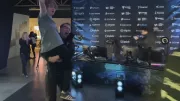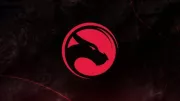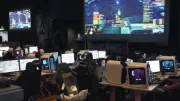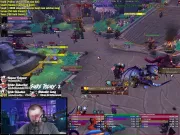
Der für die Foren von Overwatch mitverantwortliche Community Manager Josh Nash hat sich gestern Abend mal wieder in den Battle.Net Foren zu Wort gemeldet und dort in einem Bluepost verkündet, dass die Entwickler von Overwatch im Verlauf der vergangenen Nacht erneut umfangreichere Maßnahmen gegen eine Vielzahl von Accounts einleiten mussten, die nachweisbar durch den Einsatz von Aim Bots, Wall Hacks oder anderen Programmen gegen die Nutzungsbestimmungen von Blizzard Entertainment verstoßen haben. Auch wenn dieser Bluepost wie üblich keine Informationen zu den genauen Strafen für diese Spieler beinhaltet, so ist es aufgrund der bisherigen Vorgehensweise aber sehr wahrscheinlich, dass alle betroffenen Spieler permanent gebannt wurden. Normalerweise reden die Entwickler von Blizzard Entertainment nicht oft über ihre Maßnahmen für den Kampf gegen Cheater in ihren Spielen, weil sie es den Herstellern der Cheats dadurch etwas schwerer machen auf ihre Aktionen zu reagieren. Da ein komplettes Schweigen aber nur schwer vermittelt, wie ernst das Team den Kampf gegen Hacker und Cheats nimmt, beinhaltete der Beitrag von Josh Nash interessanterweise auch noch einige Absätze zu der Arbeit der Entwickler und der vom Team angestrebten Philosophie. Dabei macht dieser Bluepost recht deutlich, dass die Entwickler keine Toleranz mehr für Cheater haben und sie außerhalb von größeren Bannwellen selbst schweigend wöchentlich an die 1000 Accounts sperren. Was das Entdecken und Identifizieren von Cheatern in Overwatch betrifft, so basieren die verteilten Banns auf einer Reihe von Faktoren. Dabei spielen dann wohl das Verhalten der Spieler selbst, von anderen Spielern eingereichte Meldungen, die automatische technische Überwachung der Warden Anti-Cheat Software und durch Machine Learning erstellte Modelle eine Rolle. Wenn Maßnahmen gegen einen Account eingeleitet werden, dann sprachen im Vorfeld für gewöhnlich mehrere dieser Faktoren gegen den entsprechenden Account. Das Team aktualisiert diese Punkte regelmäßig und versucht den Cheatern immer einen Schritt voraus zu sein. Weitere Details zu diesem Thema findet ihr in dem folgenden Bluepost von Community Manager Josh Nash. Overwatch Bans: Long-term Mentality and Recent Action Hey everyone, have a slightly different topic to post about today – Let’s talk hack-related bans. Over the course of Overwatch’s five-year history, we’ve been monitoring and taking action against software used to cheat the game. A number of teams are dedicated to not only actioning accounts found guilty of hacking, but also improving our systems to help with automatic detection. Overwatch developers, security engineers, cross-functional risk experts, and multiple customer service support teams work in tandem to frequently and meaningfully take action against bad actors. When we talk about anti-cheat, we are always cognizant of some risks involved: It’s in our players’ best interest that we don’t serve to amplify this software It’s in our players’ and developers’ best interest to not communicate when fixes are implemented – We’d rather catch those using them off-guard to make sure their accounts are properly actioned It’s in our developers’ best interest to not provide details surrounding the wheres, whats, and hows that this software works. Developing tools to counteract hacking software can be a game of cat-and-mouse, and the less information we provide, the less we’re offering for identifying potential workarounds We want to start being a bit more communicative on this subject in general. While action has constantly been going on behind the scenes, it can be hard to understand or gauge how seriously we take hacking if we don’t talk about it from time to time. Despite being quiet on this subject, our team is working to identify and take action against cheaters on an ongoing basis. Sophisticated cheat developers take extreme measures to hide their programs, running them as kernel drivers or hypervisors. These cheats take extra effort to analyze and detect, which is why periodically we do large banwaves. These waves typically target tens-of-thousands of accounts for action based on new detection criteria. Given the high amount of accounts actioned within a short period of time, these are usually the only times that it’s obvious that we’ve rolled out new anti-cheat updates. We still stay busy between these larger banwaves, banning around a thousand accounts for cheating every week. Today, we’ve rolled out a banwave that affected more than 10,000 accounts. Without getting too technical on how, our cheat detection incorporates multiple methods to help us better identify when players are cheating in Overwatch. Considered factors include behaviors exhibited by the player, accrued reports against a player, machine learning models, and technical detections through our Warden anti-cheat software. Actions typically involve a combination of these factors. The team works hard to keep our detection methods accurate and up-to-date on a regular basis. We want to remind everyone that one of Blizzard’s core values is to “Play Nice, Play Fair.” We stand by this and our teams will continue to work hard to take action against accounts identified as cheating. If you feel that you are in a game with someone using malicious software, please use the in-game reporting feature. This helps gets players on our radar so that our teams can review and take appropriate action when necessary. Thanks for your time! We’ll check back in a later date with more updates as we continue to work hard for you. (via)



















![Let's Play WoW - Priester - #49 Pandamonium! [Deutsch] Teaser Bild von Let's Play WoW - Priester - #49 Pandamonium! [Deutsch]](/sites/wowchannel.de/files/styles/ratio_4x3_xs/public/media/images/shjami/2024-04/a43683d33b40f413228d54e3c6ed4a2f.jpg.webp?itok=c9H4Htwf)


